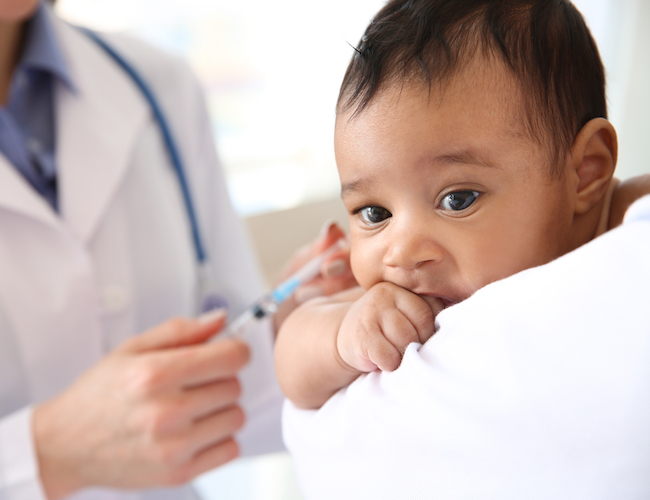Expert answers to your top vaccination fears
If your little one is due for vaccinations soon, you might have a few concerns regarding the safety and possible negative side-effects of these vaccinations.
We asked paediatrician Dr Dewald Buitendag to answer your most pressing questions and fears around vaccinations.
Q: Are vaccinations harmful in any way to babies and children?
A: Research has repeatedly shown that vaccinations are not harmful to babies and children. But there are groups of people who are against vaccinations and who believe they’re dangerous.
For instance, some argue that vaccinations contain chemicals such as formaldehyde, aluminum and mercury, which are harmful to our bodies. Others say that modern medicine is killing us, and that natural immunity is the way to go.
For each of these arguments, there is also a scientifically researched counter argument. It’s true that there are chemicals in vaccines, but the amount is negligible. Babies and children take in more of these chemicals in their daily lives than what’s present in a single dose of the vaccine.
Also, vaccinations introduce a “weakened” form of a germ into our bodies to help make the antibodies needed to fight that particular germ. This helps to prevent the onset of illness. So, if your child isn’t vaccinated and gets into contact with the germ the natural way, they may get very sick or even die from it.
Q: What are the possible side effects of vaccines?
A: The most common side effects are tenderness, redness or slight swelling at the injection site. Some children experience a mild to moderate fever for a day or two as well general fussiness and irritability.
The measles vaccination can cause a skin rash about 5-10 days later, but this doesn’t mean your child has measles. These side effects are usually not serious and go away on their own within a couple of days.
The good news is that these mild reactions show that the vaccine is working and that your little one’s body is doing its job – to make new antibodies that will be able to “fight” the actual illness should your child happen to get into contact with it.
Q: Do any vaccines cause autism?
A: The short answer is no.
In 1998, Dr Andrew Wakefield published an article in a medical journal in which he claimed that he discovered a link between autism and the measles, mumps and rubella vaccine (MMR).
It was later discovered that his research was fabricated and not true. By this time, however, the damage had been done and many parents were fearful that this vaccination caused autism.
Since then, scientists have done extensive research to determine whether there is any link between childhood vaccinations and autism. The results of this research clearly show that vaccinations don’t cause autism.
If a child is predisposed to autism, the symptoms may appear at about the same time that certain vaccinations are given, but there’s no causal link between vaccinations and autism.
Q: What do you wish parents knew about vaccinations?
A: Vaccinations are highly regulated. They go through multiple phases of testing to make sure they’re safe, as well as to find the correct dose and to see if protection against the disease works.
Once they’re on the market, there’s continuous monitoring of their possible side effects.
The likelihood of a severe reaction to a vaccine is therefore extremely small.
Vaccines remain one of the most effective tools to control and prevent many infectious and life-threatening diseases.
IMAGE CREDIT: shutterstock.com



